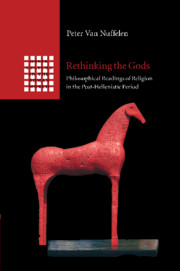Book contents
- Frontmatter
- Contents
- Acknowledgements
- Abbreviations
- Introduction
- Part I Ancient wisdom
- Part II Cosmic hierarchy
- Chapter 5 Towards the pantheon as the paradigm of order
- Chapter 6 The Great King of Persia and his satraps
- Chapter 7 Dio Chrysostom
- Chapter 8 Plutarch
- Part III Polemic and prejudice: challenging the discourse
- Bibliography
- Index
Chapter 7 - Dio Chrysostom
Virtue and structure in the kingship orations
from Part II - Cosmic hierarchy
Published online by Cambridge University Press: 05 December 2011
- Frontmatter
- Contents
- Acknowledgements
- Abbreviations
- Introduction
- Part I Ancient wisdom
- Part II Cosmic hierarchy
- Chapter 5 Towards the pantheon as the paradigm of order
- Chapter 6 The Great King of Persia and his satraps
- Chapter 7 Dio Chrysostom
- Chapter 8 Plutarch
- Part III Polemic and prejudice: challenging the discourse
- Bibliography
- Index
Summary
As we have seen in Chapter 4, Dio Chrysostom's corpus consists of speeches addressed to popular but educated audiences in Greek cities across the Roman Empire. Given their highly performative nature, these speeches do not aim at the meticulous exposition of philosophical positions. This chapter consequently has a limited aim and argues that we can notice the impact of the descriptive account of kingship, as set out in Chapter 5, in two of Dio's kingship orations. The kingship orations have recently been subjected to detailed analyses. Moles’ close study of the speeches and their philosophical argument has shown that Dio uses praise not so much to describe reality as to shape the ideological discourse justifying the rule of the emperor Trajan – although Dio on occasion combines this with covert criticism. S. Swain has drawn attention to the fact that Dio's praise of Rome seems tempered by a belief that the world is in decline. By focusing rather on the literary set-up of the speeches, T. Whitmarsh has, in turn, suggested that Dio actually took a much more subversive stance towards Roman rule. All these scholars agree, however, in seeing Dio's argument as focusing on the virtues and good character of the true king, qualities acquired through an imitation of the supreme king, Zeus. It is certainly true that this is what the orator explicitly pretends to be doing, but, developing a suggestion by M. Trapp, I wish to show in the following pages that Dio situates the ideal king in a cosmic hierarchy. Indeed, some passages can only be properly understood when that perspective is taken into account. His account of kingship thus incorporates descriptive and prescriptive elements, exemplifying what I have argued is a general tendency of Post-Hellenistic thought. Two of the orations, numbers 1 and 3, the first and the last to be written by Dio, are the most relevant to my argument.
The third kingship oration
At first sight, Oration 3, allegedly addressed to the emperor Trajan, seems eminently concerned with kingly virtue. Indeed, Dio opens the speech with a question Socrates was once asked, whether he considered the Persian King a happy man. Socrates characteristically dodges the question: he can only answer it with full knowledge of the king's character, because happiness does not depend upon one's wealth or station. The question seems to set the tone for the rest of the speech in suggesting that true kingship, of which the Persian King clearly is not an example, has less to do with power and position than with character and virtue. Yet this avowed purpose is from the very start undercut by considerations of a different nature. In the introductory part, Dio describes Trajan as a judge who is more just than judges selected by lot, a king gentler than the magistrates of a city, and a general more courageous than rank and file soldiers (5). One can read this as a summary of kingly values such as justice, equity and courage but, at the same time, such images indicate the superior position the emperor occupies in a hierarchy. And indeed, at one point Dio mentions explicitly that not only his virtues but also his position make Trajan happy: ‘I affirm that you are clearly a blessed man, possessing the greatest authority (δύναμις) after the gods’ (3). Later Dio emphasises that Trajan owes his position to the gods (8).
- Type
- Chapter
- Information
- Rethinking the GodsPhilosophical Readings of Religion in the Post-Hellenistic Period, pp. 147 - 156Publisher: Cambridge University PressPrint publication year: 2011

